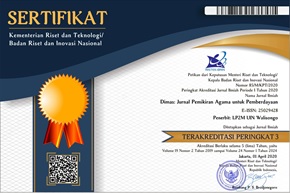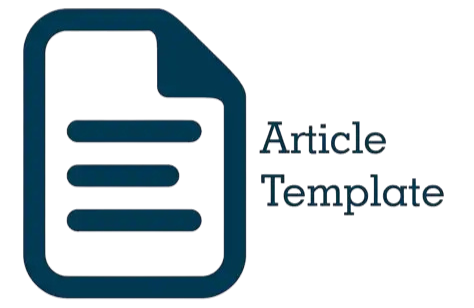Program Pengelolaan Kebersihan Lingkungan di Pesantren
DOI:
https://doi.org/10.21580/dms.2017.171.1510Keywords:
lingkungan, pesantren, penguatan, perempuanAbstract
Hygiene management is an issue that is very important for the sustainability of a healthy environment. However, people in general seem difficult to implement a clean and healthy life. The presence of plastic in conjunction with the development of manufacturing has resulted into a big problem for the environment. On the other hand, Islam strongly encourages cleanliness and environmental management. Based on the above considerations by taking the focus of activities in Islamic boarding house, and to use “dialog warga”approach with the ABCD method, this program aims to change the behavior of students to be aware of the importance of hygiene, garbage sorting and understand the principle of using the principles of reuse, reduce and recycle. After the end of the program found that the process of habituation behavior of cleanliness must be preceded by changes in the knowledge system.Downloads
References
Ali Aziz, Muh., 2005. Dakwah Pemberdayaan Masyarakat: Paradigma Aksi Metodologi, Yogyakarta: Pustaka Pesantren.
Beauleu, L, 2002. Maping the Assets of Your Community: A Key Component for Building Local Capacity, SRDC Series# 227, Misisisipi State: Southern Rural Development Center.
Dhofier, Zamakhsyari, 2011, Tradisi Pesantren, Jakarta: LP3ES
Effendi, Bachtiar, 1985. “Nilai Kaum Santri” dalam M. Dawam Rahardjo (ed.), Pergulatan Dunia Pesantren Jakarta: P3M.
Featherstone, Mike, Postmdernisme dan Budaya Konsumen, terj. Misbah Zulfa Elizabeth, Yogyakarta: Pustaka Pelajar
Gilarso, T. 2004. Pengantar Ilmu Ekonomi Makro, Yogyakarta: Kanisius
Halim, A et.al., 2005. Manajemen Pesantren, Yogyakarta: Pustaka Pesantren
Jennie, Betty Sri Laksmi dan Winiarti Pudji Rahayu, 1993. Penanganan Limbah Industri Pangan, Yogyakarta: Kanisius
Korten, David C., 1987. “Development as Human Enterprise” dalam Community Management: Asian Experience and Perspectives, Conecticut: Kumarian Press.
Lynam, S, 2006. Community Development and Public Policy, Dublin: Combat Poverty Agency
Malik, Jamaluddin, 2005. Pemberdayaan Pesantren, Yogyakarta: Pustaka Pesantren.
Qomar, Mujamil, Pesantren: Dari Transformasi Metodologi Menuju Demokratisasi Institusi,
Spradley, James, 2001. Metode Etnografi, terj. Misbah Zulfa Elizabeth, Yogyakarta: PT. Tiara Wacana
Suharto, Babun, 2011. Dari Pesantren Untuk Umat: Reiventing Eksistensi Pesantren di Era Globalisasi , Surabaya: Imtiyaz.
Prasodjo, Sudjono, 1982. Profil Pesantren, Jakarta: LP3S)
Tim Penulis PS, 2008. Penanganan dan Pengelolaan Sampah, Jakarta: Penebar Swadaya.
Wirosardjono, S, 1988. “Pesantren and the Role of Islam in Indonesia” dalam Manfred Oepen dan Wolfgang, The Impact of Pesantren in Education and Community Development in Indonesia, Jakarta: P3M.
Downloads
Published
Issue
Section
License
Copyright
The copyright of the received article shall be assigned to the journal as the publisher of the journal. The intended copyright includes the right to publish the article in various forms (including reprints). The journal maintains the publishing rights to the published articles. Therefore, the author must submit a statement of the Copyright Transfer Agreement.*)
Licensing

This work is licensed under a Creative Commons Attribution-ShareAlike 4.0 International License.
In line with the license, authors are allowed to share and adapt the material. In addition, the material must be given appropriate credit, provided with a link to the license, and indicated if changes were made. If authors remix, transform or build upon the material, authors must distribute their contributions under the same license as the original.
_______
*) Authors whose articles are accepted for publication will receive confirmation via email and send a Copyright Transfer Agreement.









